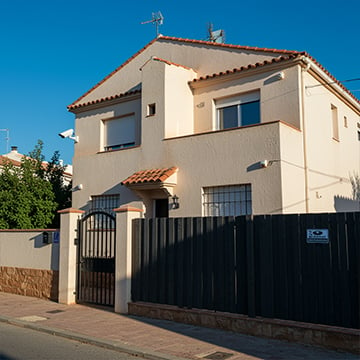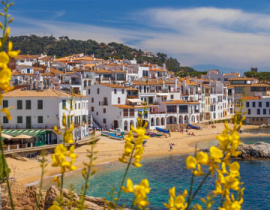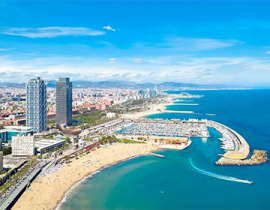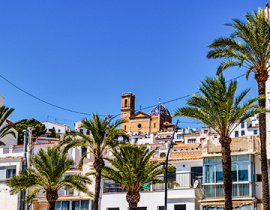- Home
- Blog
- Tips & Advice
- Okupa Reality in Spain and Guide to Protecting Your Property
Okupa Reality in Spain and Guide to Protecting Your Property
Buying real estate in Spain is often seen as a gateway to a sunny lifestyle, peaceful days by the sea, and attractive investment opportunities. However, one topic has increasingly captured public attention and raised concerns among potential buyers: okupas in Spain. But is this issue as alarming as it seems, or is it an exaggerated media narrative? In this article, we provide in-depth insight into the okupas Spain law, legal rights, eviction processes, and ways to protect your property.
What Are Okupas?
The Spanish term “okupa” refers to a person who occupies a property without the owner's consent. In practice, okupas are often individuals who illegally occupy empty or unused homes without authorization. Some may be homeless or struggling financially, while others act in more organized groups. However, don't worry—this is not a widespread issue throughout Spain currently and can be prevented with some simple precautions. Regardless of their circumstances, occupying a property without permission is illegal and can cause ownership complications. So, if you're wondering what is okupas in Spain, know that it’s a complex legal and social matter but manageable with the right approach.
Okupas Law in Spain: Rights and Responsibilities
The okupas law in Spain seeks to balance the right to private property with the constitutional right to housing. This balance can lead to lengthy and complex legal battles for eviction. If a property is occupied and the owner reports it within the first 48 hours, police can act without a court order — a crucial window outlined in the Spain squatters 48 hours rule.
After this timeframe, Spain okupas law mandates a formal legal process. The property owner must go to court, and proceedings may take several months depending on the local judicial backlog. At this stage, the eviction process for okupas in Spain comes into play, and timely legal support becomes essential.
How the Eviction Process Works
The legal process of eviction, known as "desahucio" in Spanish, involves serving a formal notice via an attorney, followed by a court decision. Once a ruling is issued, law enforcement handles the eviction. If the squatters are families with children or under social protection, the process may be more delicate. Nevertheless, understanding how to evict squatters in Spain is vital for any property owner.
Some municipalities offer alternative housing to squatters, which can expedite the eviction. Still, anyone asking how to get rid of squatters in Spain should be prepared for a patient and legally sound approach.
Do Squatters Have Legal Rights?
Yes. In Spain, both property rights and the right to shelter are constitutionally protected. Therefore, squatters rights in Spain are acknowledged under a specific legal framework. However, this doesn’t mean squatters can permanently remain in your property. The law also ensures that your ownership rights are restored—eventually—through proper legal action.
The belief that “the state always protects the squatter” is overly simplistic. When you begin the legal process, the law will ultimately side with the rightful owner. In truth, squatters in Spain may gain temporary protection, but not ownership.
How to Avoid Okupas in Spain
Avoidance is often more effective than intervention. If you’re wondering how to avoid okupas in Spain, here are several preventative strategies:
Alarm and Security Systems: Even if the property is vacant, active alarms can deter occupation attempts. Most modern systems are linked directly to law enforcement.
Don't Leave Properties Unattended: If you're investing in Spain real estate safely, avoid leaving your home vacant for extended periods. Short-term rentals can generate income and make the property appear lived-in.
Connect with Neighbors: Your neighbors can alert you to suspicious activity. This form of local vigilance is common in many safe places to live in Spain.
Professional Property Management: Reliable companies like TEKCE Property Management can regularly inspect your property, manage rentals, and keep you informed. This is especially helpful for foreign property owners in Spain.
Additional Tips for Property Owners
Foreign homeowners often face language barriers and legal differences that can be daunting. However, with proper advice, these hurdles are manageable. A good real estate consultant won’t just assist during the purchase but will continue to help with property management, security, insurance, and legal compliance.
Can Okupas Gain Property Rights?
One of the most misunderstood concepts is okupa property rights in Spain. Contrary to popular belief, unauthorized occupation doesn’t lead to ownership. However, in rare and extremely long-term cases, the concept of “usucapión” (adverse possession) might apply — but only under very specific conditions. Rest assured, a few months of illegal occupation does not endanger your ownership.
Is Spain Safe to Live In?
This question often arises in the context of okupas: is Spain safe to live? In fact, Spain is one of the safest countries in Europe, with very low crime rates. Of course, safety can vary by neighborhood. Popular coastal areas and communities with high expat populations tend to be especially secure. If you’re looking for safe places to live in Spain, consider Costa del Sol and Costa Blanca.
How to Secure Your Property in Spain
So, how to secure your property in Spain effectively?
Work with professionals.
Understand the legal process.
Purchase adequate insurance.
Invest in security systems.
Keep the property in regular use when possible.
These practical steps offer solid protection against illegal occupation and address concerns like how to stop squatters in Spain with real, actionable solutions.
Stay Informed, Stay Protected
Yes, the okupa issue exists in Spain. But for informed property owners, it is a manageable risk — not a reason for fear. The squatters law in Spain aims to balance all parties' rights, and your biggest asset is knowledge. Legal clarity and reliable support are key to navigating this landscape.
If you're planning to buy or already own property in Spain, TEKCE Property Management is here to help. Whether you're buying, renting, or managing, we’re ready to guide you toward peace of mind.
Get in touch with us today, and let’s create the safest plan for your property together.









